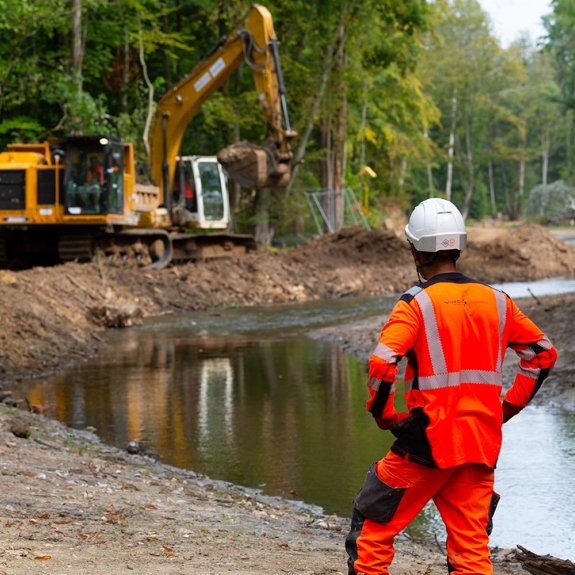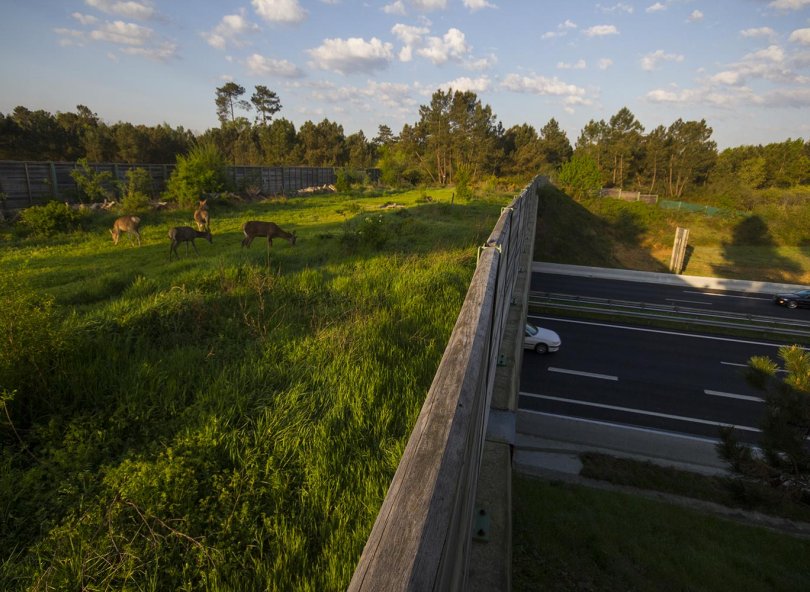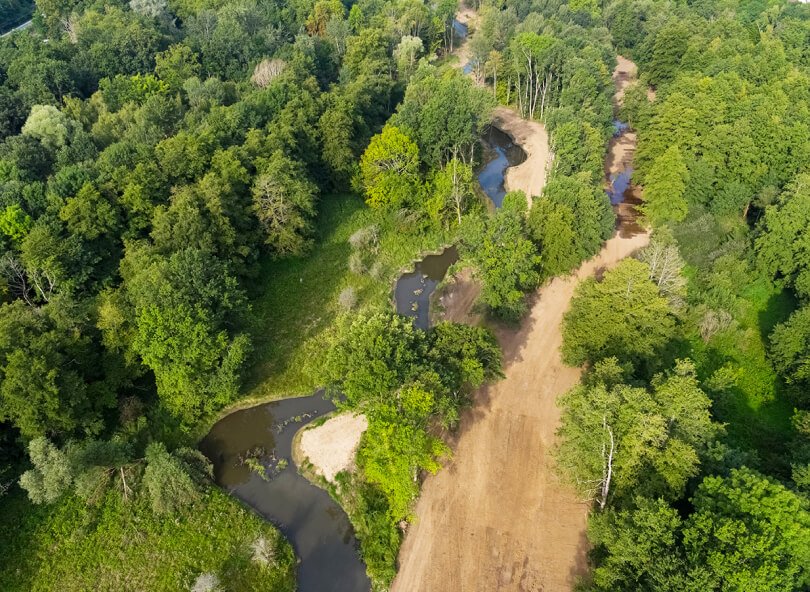
Sustainability reports
As VINCI’s activities impact their natural surroundings, we integrate preservation into our design, construction and operating processes.
We strive to minimise effects on biodiversity, develop solutions to preserve water resources and regreen areas throughout the life cycle of our projects.

Quick access

VINCI teams up with conservation and scientific institutions and other organisations to develop and implement solutions that address ecological challenges relating to water, ecosystem restoration and biodiversity preservation.
In their various roles – as developer, builder or operator –, the Group’s entities are specialising in and structuring their expertise in ecological engineering and the associated products, services and solutions.

VINCI’s goal in everything it does is no net loss of biodiversity, and we draw up and apply environmental management plans on all our projects. These plans provide indicators, establish governance arrangements and clearly assign responsibility for assessing and limiting effects on wildlife in the areas where we operate.
We have also developed a wide range of awareness and training tools for our employees.
Target
0
phytosanitary products in concession operations by 2030
49
of VINCI’s 54 airports use no phytosanitary products
€7.3bn
in Group revenue from projects awarded environmental certifications and labels (BiodiverCity, BREEAM, etc.)

Timber construction: choosing a material with a low carbon footprint
Arbonis is a VINCI Construction subsidiary specialised in timber construction. This material, sourced from sustainably managed forests, has a low carbon footprint and helps to meet environmental performance objectives in the building sector. Applying the latest technologies and methods, the company designs and builds all types of timber structures and facilities. Arbonis is most notably taking part in the Treed It sustainable city demonstrator in Marne-la-Vallée, east of Paris, which includes the construction of a 12-storey, 37 metre high timber-frame tower. It has also developed the modular ARBO 3D process, which combines prefabricated elements, rapid on-site installation, great architectural flexibility and cost control. This process is well-suited to the construction of buildings like schools and student accommodation.

Responsible management of public land around motorways: protecting biodiversity
In a concern for sustainability, VINCI Autoroutes initiated a programme to achieve excellence in the responsible management of its motorway network. Between 2018 and 2022, VINCI Autoroutes reduced its use of pesticides by 98%, reflecting its commitment to shift towards more environmentally-friendly practices. In addition, VINCI Autoroutes installed 1,118 special structures across its motorway network to enable wildlife to safely cross motorways, such as overpasses and underground tunnels.
The VINCI Autoroutes Foundation also plays a crucial role in this environmental policy. Since 2022, it has become involved in a new field of action, supporting projects to preserve and restore natural heritage in regions. The VINCI Autoroutes Foundation supports initiatives led by local actors that aim to improve living conditions for plant and animal species. In parallel, a strategic partnership with the French National Forest Office (ONF) was forged to restore 200 ecological sites along the motorway network, covering a total surface area of 500 hectares, by 2030. This ambitious initiative demonstrates VINCI Autoroutes’ commitment to reconcile infrastructure development with the preservation of biodiversity.

Partnership between VINCI Construction and PatriNat: promoting ecological innovation
Biodiversity preservation is a global priority. As a result, a partnership was initiated in 2012 between the Road Division of VINCI Construction and PatriNat – a collaborative research and education entity focused on natural heritage and affiliated with the French Office for Biodiversity –, France’s National Museum of Natural History and the National Centre for Scientific Research, which is spearheading the industry.
This partnership has contributed to expanding scientific knowledge of biodiversity. For example, scientific solutions and methods were developed to measure the impact of Eurovia’s activities on biodiversity, such as the Ecological Quality Indicator (IQE) and a toolbox for assessing biodiversity specially designed for linear infrastructure (OEIL). These tools are now used by planners and quarry operators to reduce their environmental footprint. This alliance has also facilitated the centralisation and analysis of data on flora and fauna collected by Eurovia, thus helping to populate national databases on biodiversity. Finally, through this partnership, strategic action plans have been implemented to minimise the environmental impact of quarries.

Virtuous airports: doing more to protect wildlife
VINCI Airports, part of VINCI Concessions, demonstrates its commitment to the environment through a set of initiatives to protect biodiversity, especially birds and insects. Between 2018 and 2023, VINCI Airports reduced the use of pesticides by 88% across its airports and aims to eventually eliminate these products completely. Measures were also taken in collaboration with the French national beekeepers association (Unaf) to protect pollinators.
This commitment to biodiversity has also taken shape in several partnerships formed across its network. For example, ANA, the VINCI Airports in Portugal, has teamed up with the CERVAS (Centre for Ecology, Recovery and Monitoring of Wildlife) and RIAS (Wildlife Rehabilitation and Research Centre of Ria Formosa). London Gatwick airport works with Sussex Biodiversity Records Centre and the Gatwick Greenspace Partnership. Its management of biodiversity was recognised by the Wildlife Trust’s prestigious Biodiversity Benchmark Award. In France, Grenoble Alpes Isère airport signed an agreement with the French Bird Protection League in October 2020. This collaboration helps the airport in south-east France to identify and highlight the biodiversity issues related to its operations.
More recently, as a step further in its commitment to protecting biodiversity, VINCI Airports signed the Buckingham Palace Declaration in the spring of 2023 and joined the United for Wildlife Transport Taskforce, an international partnership for the fight against species trafficking.

Restoration of ecological connectivity: rehabilitating natural environments
VINCI Construction applies its ecological engineering expertise under the Equo Vivo brand, to build structures designed to preserve and enhance natural ecosystems.
One key project in this area is the hydromorphic restoration of the Yvette, a river in the regional nature park of the Upper Chevreuse Valley in France. Led by Equo Vivo (VINCI Construction), this project has restored characteristics closer to the river’s natural state, while improving its capacity to handle flooding by absorbing excess water.
Our operations need water and can therefore have a direct and/or indirect impact on natural environments. Optimising water consumption, therefore, is as vital as preventing water pollution.
Target
10%
reduction in water consumption per unit of traffic for VINCI Concessions (compared with 2018)

Smart irrigation: optimising our customers’ water consumption
In today’s world, where the efficient management of natural resources is crucial, Axians, VINCI Energies’ subsidiary specialised in ICT (Information and Communication Technologies) stands out for its innovation in smart irrigation, with advanced technology that combines information from temperature and ground humidity sensors with weather data.
One striking example of how efficient this technology can be comes from Florence, Italy. Using this system, the city reduced its water consumption by 30%. This success has demonstrated not only the effectiveness of the smart irrigation solutions available from Axians but also their potential to transform water management in urban and rural environments.

Preserving natural environments also involves significantly slowing land take. Advancing urban development while addressing ecological challenges will involve building more on plots that are already sealed – i.e. recycling land.
We intend to play our part through our subsidiary VINCI Immobilier, the first French property developer to pledge to reach the no net land take target 20 years ahead of the deadline in France’s Climate and Resilience Law, enacted in 2021.
Target
0
net land take by VINCI Immobilier by 2030
Target
+50%
of VINCI Immobilier revenue from land recycling operations by 2030
6%
of soil sealed due to VINCI Immobilier operations in France
70%
of VINCI Immobilier’s revenue already comes from land recycling operations